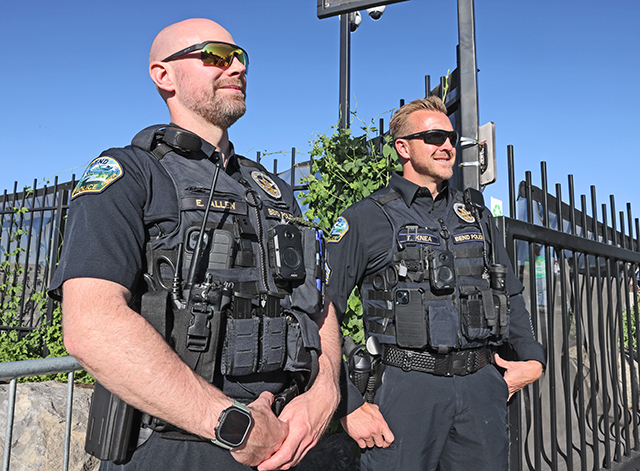Appeals court decision could affect Lara murder case
Published 4:33 am Wednesday, September 20, 2017

- Edwin Lara sits with his defense team during a hearing on March 23, 2017, at the Deschutes County Circuit Court in Bend. (Joe Kline/Bulletin photo)
As Deschutes County Circuit Judge A. Michael Adler considers whether suspected murderer Edwin Lara’s apparent confession was legally obtained, a recent appeals court decision could provide some guidance.
On Sept. 7, the Oregon Court of Appeals issued a decision in a Washington County case, State v. Sanelle. Paul Sanelle was convicted of murder by a jury in 2013, but the appellate court decision says Sanelle’s confession should not have been introduced at trial. The court ruled Sanelle made an equivocal — or ambiguous — invocation of his right to a lawyer.
After being read his Miranda rights, Sanelle said, “Where is my lawyer?” Under Oregon law, investigators in such situations are required to ask clarifying questions to determine whether a suspect is, in fact, asking for a lawyer.
Sanelle’s case calls to mind a pair of similar statements Lara made following his arrest. Adler must now decide whether Lara invoked his right to a lawyer, a decision that could endanger the admissibility at trial of the lengthy statement Lara subsequently made to police.
Lara, 32, is accused of killing Kaylee Sawyer, 23, in the early morning hours of July 24, 2016, while he was working as a security guard for Central Oregon Community College in Bend. He is charged with four counts of aggravated murder, the only crime punishable by death in Oregon. Deschutes County District Attorney John Hummel is seeking the death penalty, and Lara is due to stand trial in October 2018.
After Lara was arrested by the California Highway Patrol, officers dropped him off at the Tehama County jail. During the exchange, Lara asked highway patrol officer Matt Szychulda, “Is my lawyer almost here?”
“No,” Szychulda responded, according to video from the jail. “It’s your right to request a lawyer. You can request a lawyer when you get a phone call.”
Following Sanelle’s arrest, he similarly asked an officer, “Where’s my lawyer?”
The officer responded by asking if Sanelle had hired a lawyer. Sanelle said he couldn’t afford one. The officer told Sanelle that one will be appointed for him and said it would happen the following Monday during his arraignment in court.
The officer then asked Sanelle if he understood his rights.
“Yes, absolutely,” Sanelle responded, before giving a confession during an interrogation.
While in the Tehama County jail, Lara asked a deputy when he would get a lawyer. The deputy responded: “Probably when you get arraigned in court.” Originally the deputy said he interacted with Lara hours before his statement to police, but video evidence later showed this likely occurred the next day.
Deschutes County Chief Deputy District Attorneys Mary Anderson and Steve Gunnels argued in court that these are not invocations of a right to an attorney, asserting that Lara could have several reasons to ask these questions. The defense argued they are unequivocal invocations. It wouldn’t make sense, they argued, for Lara to ask twice about a lawyer if he had no interest in talking with one.
The Oregon Court of Appeals ruled that Sanelle’s statement was equivocal and that the officer failed to ask clarifying questions. The confession, therefore, was tainted.
Lara’s defense team has said both of Lara’s questions about an attorney were requests for a lawyer that were ignored by law enforcement in California. Twelve days of hearings examining whether Lara’s questions were indeed an invocation concluded on Sept. 8. Adler said he will announce his ruling in open court but has not set a specific date.
On Sept. 7 following a break from court, defense attorney Benjamin Kim brought up the Sanelle decision and argued that it should be considered when deliberating the Lara case. Both the prosecution and defense agreed to submit written briefs on the Sanelle ruling, and Adler also said he would review the appeals court decision. Nearly all documents in the case are sealed due to a gag order Adler imposed, so it is not clear if the briefs have been submitted or what they say.
Tung Yin, professor at Lewis & Clark Law School, said the Sanelle appeals court ruling doesn’t break new ground but affirms case law on the issue. Adler needs to decide if Lara’s statements fit within the reasoning of the Sanelle case.
Yin said an example of a clear invocation would be along the lines of “I will not talk to you until I get a lawyer,” and a waiver would be “I don’t need a lawyer — I will talk to you.” But in the middle are statements like Lara’s or Sanelle’s.
“The suspect is asking about a lawyer, and so any of these questions are at least somewhat suggesting that the person has some interest in a lawyer,” Yin said.
Yin said Article 1, Section 12 of the Oregon Constitution requires this to ensure someone’s confession isn’t the product of coercion. He said when the U.S. Supreme Court ruled in the 1960s that defendants need to know their rights before an interrogation, police worried they would never be able to get confessions. That didn’t happen, he said, and he doubts asking clarifying questions would have much impact either.
“I would think that the district attorneys’ offices might tell the police, ‘If you are not sure if they are asking for a lawyer, you should clarify,’” he said.
— Reporter: 541-383-0376, awieber@bendbulletin.com






